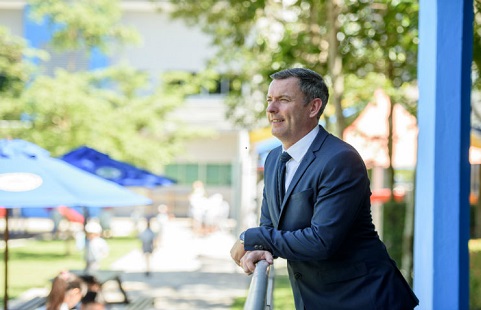
What would it take to achieve success with two different curricula running at the same time in your school? The Educator Asia spoke to Iain Sallis, campus principal at Tenby Schools Penang in Malaysia to find out how he has been managing to do it for the past two years.
Tenby Schools has a unique dual-curricula model, offering the international UK curriculum as well as Malaysia’s national curriculum as a private school.
With both primary and secondary cohorts following either structure, Sallis essentially oversees four schools on campus and has to ensure that students in the international school and those in the private national school perform to the best of their abilities.
TEA: What are some of the challenges in managing both an international school and a private national school on the same campus? How do you overcome them?
IS: It’s great fun having two types of school on one campus. One of the biggest challenges is ensuring that we operate and manage effectively.
We have two calendar years; January to December and September to August. We share the same facilities, same uniform, same classrooms at times and students have equal access to clubs and co-curriculars too, so we are “as one” most of the time.
We run many shared assemblies and campus assemblies supporting international themes, cultural and religious festivals. Each school has a head of school, so they are accountable for the learning within their school.
Policies are shared across the campus, but the main challenge is identifying when to allow schools to work independently and have their own identity and when we need to work collectively to support the vision and mission. Most of the time we seem to get the balance right!
TEA: How do you ensure that all students receive the best education – regardless of whether they’re taking the international or national curriculum?
IS: We provide a holistic and amazing learning experience. We believe that students need to get better at doing things and learn how and why they should do this. We get outstanding results across all four schools.
Our international school results for the IGSCE and ‘A’ levels average at an A grade and that puts us among the best in the UK. In the last three years students have attended over 30 renowned universities ranging from Cambridge University to London School of Economics.
However, in the real world, we all know high performing companies ask for more than just good grades. During the job application stage I am aware of top companies that don’t ask about what university you attended or the level of degree achieved.
The need for a holistic skills-based approach is therefore becoming more important. At Tenby Penang we call these “the extras” and believe that this will give our learners the edge.
We provide holistic opportunities to ensure learners have the skills to communicate, be resilient, adapt and be creative. This includes Model United Nations conferences, world scholars cup, work experience weeks and STEM-based learning such as coding and robotics classes that support the wider learning model to create global learners.
Tenby also have a very strong vision and mission statement and have clearly defined statements of international learning and high-quality learning. We believe that if our students don’t get better, then we are not doing our jobs properly.
TEA: From 2014 to 2016, you were headteacher of secondary at Tenby International School in Kuala Lumpur and are now managing four different schools as Campus Principal at Tenby Penang. What helped you achieve that career progression?
IS: With 19 years of experience in the industry, having spent 15 years in a senior leadership position, rarely does money or the need for extra time factor into my decision to take opportunities.
Before arriving in Malaysia, I was the acting head of a school in the UK. I was also an advanced skills teacher in the UK and have been involved in every position in a secondary school apart from doing timetable (it’s a pet hate of mine), so I have plenty experience.
I have been a senior facilitator for the National School of Leadership and worked with the Institute of Education over a period of 10 years delivering leadership programmes. I believe that my experience has been a part of my learning journey and has had a great impact on my career progression.
I am now leading in my sixth school in differing contexts; I have a clear idea of what an exceptional education looks like and what makes things better. In short, my past experiences have given me the advantage of being able to get the right balance of both business and academic.
Coaching techniques play a large part on how I communicate as well. I am still learning daily to be better and more holistic in my approach.
TEA: How have your past experiences impacted your current role as campus principal – especially in terms of leading Tenby’s school leaders?
IS: I am in a great position where I have done virtually every job in the school. My areas to develop when I arrived were to improve my knowledge of primary schools and differing curriculums.
I have loved observing fantastic staff teach the national and primary curriculums. It’s a real joy to see amazing learning in our school. The curriculums across schools and between schools are closer than ever, so the perceived gap between the international and national is narrow.
I have some very experienced heads of schools so my ability to coach and mentor other leaders is critical. We have a reflective culture and operate leadership skills reviews and run a reflective practice leadership model. One example of this would be the coaching feedback to our senior leaders on their feedback techniques to staff during observation meetings.
As leaders we are continually looking at what we do first before others.
Related stories:
Inside Singapore American School’s personalised curriculum program
Inside Malaysia’s new ‘holistic’ international school


